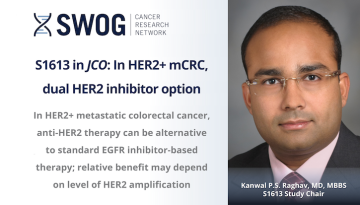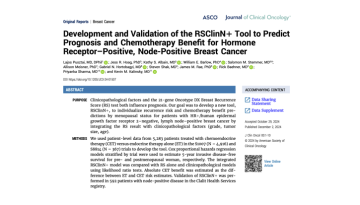A Year-1 Update from SWOG’s DEI Fellow
Patricia Robinson, MD, has been SWOG’s DEI fellow for one year now. She received our first Career Development Award for Diversity, Equity, and Inclusion, and earlier this week she reported to group leadership on progress made and on the plans she – and others leading diversity efforts within SWOG – have for the coming year.
I’ve been issuing regular updates in this column on SWOG’s efforts in this area, so some of what Dr. Robinson reported has been discussed in Front Line previously. Also, the number of achievements and the impressive quantity of data and documentation she and her colleagues have assembled mean I have space here only to touch on highlights.
Overall, the goal for year 1 was to implement the methodology from TeamScience@SWOG Module 6 for diversifying accrual to our clinical trials, and this is well on its way. In fact, our pilot group of DEI champions and our DEI monitoring committee continue working with a process for assessing and improving trial diversity.
I’ve written several times of the DEI champions we now have in place in five of our committees. These champions have been extremely active, and Dr. Robinson detailed for us some of the activities they and their study teams are now engaged in or have already completed:
- Developing a demographic questionnaire on sexual orientation and gender identity to begin collecting this data within an ongoing study so we can better assess diversity across these dimensions
- Establishing a DEI subcommittee within a research committee to institutionalize the incorporation of diversity objectives into the process of trial development
- Designing a culturally appropriate accrual plan to recruit more veterans and people of color to an ongoing trial
- Performing a demographic analysis of potential sites before study activation as part of a plan for equitable inclusion of ethnic minorities in a study now in development
Our DEI monitoring committee held its kickoff orientation last month and is on the calendar for next month to finalize its charter and select a committee chair. As I’ve described before, this group is analogous to a data and safety monitoring committee, but with a focus on the diversity of participation in our trials.
SWOG biostatistician (and monitoring committee member) Katherine Guthrie, PhD, has led the creation of tables detailing the diversity of SWOG clinical trial participant populations by study and by research committee, across factors of race, ethnicity, gender, and age. These will serve as some of the raw data this committee will use in developing a strategic plan to improve representativeness of our clinical trial participant populations.
On another front, the ad hoc search committee convened to identify and vet candidates for a new position of SWOG vice chair for diversity, equity, inclusion, and professional integrity (VCDEII) reports progress in identifying promising candidates. This is a much-anticipated appointment. As Dr. Robinson eloquently put it, the VCDEII will be the glue that binds together the multiple DEI efforts within SWOG.
The year-1 accomplishments Dr. Robinson detailed will support year-2 strategies focused on operationalizing these advances, to improve our trial design process in the areas of cultural competence, population forecasting, and community engagement.
After Dr. Robinson finished her truly impressive presentation, the group discussed the importance of communicating broadly about our efforts to enhance diversity and about the value we place on these goals.
Dr. Robinson highlighted the need for candor – to be forthright in not only trumpeting our successes, but also honestly discussing where we’re falling short and, ideally, what we’re doing to remediate those shortfalls.
Our Lung-MAP master protocol has given us a recent opportunity to demonstrate such candor. SWOG biostatistician Riha Vaidya, PhD, led an analysis of this study to assess how well its enrolled participants represent the larger population of patients with advanced non-small cell lung cancer (NSCLC). She reported at ASCO that, compared to other SWOG trials in advanced NSCLC, Lung-MAP has enrolled relatively more patients from rural areas, more patients with Medicaid or no insurance, and more patients from the most deprived neighborhoods.
But she also reported – and we reflect this in the latest quarterly Lung-MAP Newsletter – that compared to the US population of patients with advanced NSCLC, patients who are Black, Asian/Pacific Islander, or Hispanic have been underrepresented in Lung-MAP (e.g., 9.2 percent of Lung-MAP patients have been Black, while nationally 14.1 percent of patients with advanced NSCLC are Black).
We can do better, and our lung committee DEI champion, Lucy Gansauer, MSN, RN, OCN, CCRP, is working specifically on the Lung-MAP trial (and its multiple sub-studies), bringing enormous energy to helping sites characterize and measure the challenges they face and working with them on solutions.
This is precisely the type of analysis, planning, and problem-solving Dr. Robinson (and many others!) have been working to operationalize in SWOG, with an eye toward reducing health disparities generally and toward ensuring the participants we enroll in our trials truly represent the populations about which we’re drawing larger conclusions.
Other Recent Stories



